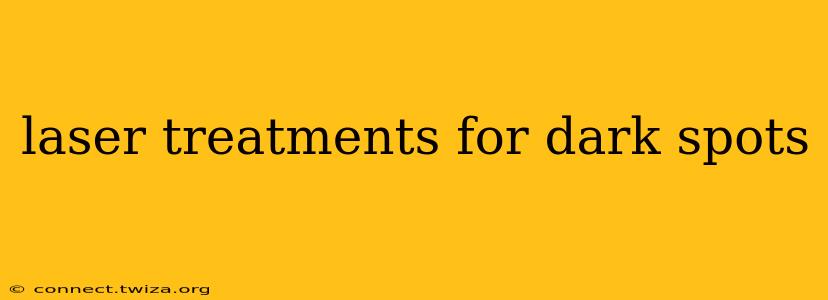Dark spots, also known as hyperpigmentation, are a common skin concern affecting many. These blemishes can range from small freckles to larger, more noticeable patches. Fortunately, laser treatments offer a highly effective solution for reducing the appearance of these dark spots, restoring a more even and radiant complexion. This comprehensive guide explores the various laser treatments available, their effectiveness, potential side effects, and what you can expect throughout the process.
What are the Different Types of Laser Treatments for Dark Spots?
Several types of laser treatments target hyperpigmentation, each with its own mechanism and effectiveness. The best choice depends on your skin type, the severity of your dark spots, and your individual goals. Common options include:
-
Intense Pulsed Light (IPL): IPL isn't strictly a laser but uses broad-spectrum light to target melanin, breaking it down and reducing the appearance of dark spots. It's often a gentler option than some laser treatments.
-
Fraxel Laser: This fractional laser treatment targets small areas of skin, leaving healthy skin untouched. This method minimizes downtime and allows for faster healing. Different Fraxel lasers exist, with varying wavelengths and depths of penetration.
-
Q-switched Nd:YAG Laser: This laser is highly effective in targeting deeper dark spots and pigment irregularities. Its short pulse duration minimizes damage to surrounding tissue. It's often used for melasma, a type of hyperpigmentation.
-
Picosecond Lasers: Picosecond lasers deliver ultra-short pulses of energy, effectively shattering pigment particles into smaller fragments for easier removal by the body. They often offer quicker results and less downtime compared to other laser technologies.
How Effective are Laser Treatments for Dark Spots?
The effectiveness of laser treatments for dark spots varies depending on factors such as the type of laser used, the individual's skin type, and the severity of the hyperpigmentation. Generally, laser treatments provide significant improvement in reducing the appearance of dark spots for many individuals. However, it's crucial to have realistic expectations; complete removal may not always be achievable. Multiple sessions are often required for optimal results.
What are the Potential Side Effects of Laser Treatments for Dark Spots?
While generally safe, laser treatments can come with potential side effects. These may include:
- Redness and swelling: This is common and usually resolves within a few days.
- Crusting or scabbing: This is more likely with more aggressive treatments and usually heals within a week or two.
- Hypopigmentation: In some cases, the treated area may become lighter than the surrounding skin. This is temporary in most cases.
- Hyperpigmentation: Rarely, the treated area may become darker. This is usually managed with post-treatment care.
How Long Does it Take to See Results from Laser Treatments for Dark Spots?
The time it takes to see results varies depending on several factors, including the type of laser used, the depth of the dark spots, and the individual's skin's healing response. Some individuals notice improvement after the first treatment, while others may require several sessions to achieve their desired results. Full results may not be apparent until several weeks or even months after the treatment is complete.
What is the Cost of Laser Treatments for Dark Spots?
The cost of laser treatments for dark spots varies significantly depending on the type of laser used, the number of sessions required, the geographic location, and the provider's experience. It's essential to obtain quotes from multiple providers before committing to treatment.
How to Prepare for a Laser Treatment for Dark Spots?
Before undergoing laser treatment for dark spots, it's vital to consult with a qualified dermatologist or cosmetic surgeon. They will assess your skin type, the severity of your hyperpigmentation, and determine the most appropriate treatment plan for you. They may advise you to avoid sun exposure and certain medications in the weeks leading up to the treatment.
What is the Aftercare for Laser Treatments for Dark Spots?
Proper aftercare is crucial for optimal results and minimizing the risk of complications. Your dermatologist will provide specific instructions, but general recommendations include:
- Avoid sun exposure: Use a high SPF sunscreen daily to protect your skin from the sun's harmful rays.
- Keep the treated area clean and dry: Gently cleanse the area and avoid harsh scrubbing.
- Apply prescribed creams or ointments: Follow your dermatologist's instructions carefully.
- Avoid makeup for a few days: This allows the treated skin to heal properly.
By following these guidelines, you can help ensure a safe and effective outcome for your laser treatment. Remember, consulting a qualified professional is key to achieving the best results and minimizing potential risks.
